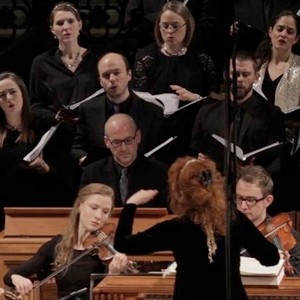by Daniel Hathaway

Handel reworked a funeral anthem for Queen Caroline into the original “Lamentation of the Israelites for the Death of Joseph.” Sorrell trims Handel’s adaptation down to a Sinfonia and four brief and affecting choruses, which is just enough to set the stage for the rest of the drama, and to balance the rejoicing of the Israelites in Part III.
“Act II: Exodus” shows Handel’s skill in word-painting. The children of Israel audibly sigh, then when God afflicts the Egyptians with a trimmed-down but no less evocative list of plagues, frogs appear “yea, even in their kings’ chambers” (jumpy music), God speaks (cue the brass), flies, lice, and locusts appear (skittering violins and cellos), hailstones fall (isolated notes), and God smites the firstborn of Egypt (slashing chords) before parting the Red Sea and drowning Pharaoh and his pursuing army.
“Act III: Moses’ Song” is an extended hymn of praise to the Lord sung by the chorus and soloists — both in arias and duets — and punctuated by the orchestra, now enhanced by triumphant trumpets, trombones, and timpani.
Chorus, soloists, and orchestra were uniformly impressive. The chorus, like the text they sang at one point, “triumphed gloriously.” Strong in tone and color and both blending with and penetrating through the orchestra, the 26-voice ensemble delivered handsome fugues (“The horse and his rider hath he thrown into the sea”) as well as dramatic unisons (“They shall be still as a stone”).
The soloists did double duty, also singing in the chorus. Ross Hauck, a Handelian tenor with perfect diction, got a laugh when he sang in recitativo, “He caused their land to bring forth frogs,” and the bright-voiced countertenor Daniel Moody carried that image to an alarming conclusion in the aria that followed (“blotches and blains broke forth on man and beast”).
Erica Schuller and Molly Netter joined their clear voices in alluring duets (“The Lord is my strength and my song”) and contributed glowing arias. Schuller also joined oboists Debra Nagy and Kathryn Montoya and bassoonist Marc Vallon in a perfectly balanced “Thou didst blow with the wind,” and Netter intoned, “Sing ye to the Lord for he hath triumphed gloriously” with clarion brilliance.
Bass Jeffrey Strauss fixed his gaze directly on the audience during his dramatic aria “To God our strength, sing loud and clear,” embellished by the well-matched tones of Nagy and the flawless trumpeter Steve Marquardt.
Alternating between the podium and the harpsichord, Sorrell led a highly nuanced performance of Israel in Egypt, seemingly every detail of its execution engraved in her score along with the notes. That approach might be regarded by some listeners as overly fussy, but Sorrell’s attention to tiny matters results in readings that are unanimous in phrasing, dynamics, and musical rhetoric — and well-calculated in dramatic impact. The large audience on Saturday responded with ardent applause
Published on ClevelandClassical.com October 17, 2017.
Click here for a printable copy of this article



